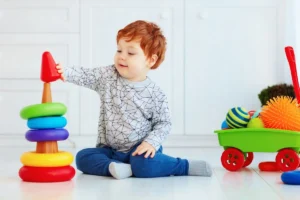You may be wondering why your toddler isn't talking yet? If you're in the 1- to 3-year-old age range, you're probably used to hearing a few babbles, recognizable words here and there, and even the beginnings of conversations. But what if your child isn't as talkative? It's normal to worry when your toddler doesn't seem to be reaching language milestones, especially when other children seem more advanced.
The first thing to remember is that every child is different. Just because little Jules at the park is happily chatting with everyone doesn't mean your child has a problem. However, it's good to know the typical stages of language development and how to help your child meet them.
When should I be concerned if my toddler isn't talking?
Language development varies from child to child, but certain milestones are generally expected at specific ages. Here's a look at common milestones:
By 18 months, a child should say about 20 words, mostly names of familiar people or objects like “mommy,” “daddy,” or “cat.” They should also understand simple words like “milk” and be able to do simple tasks when asked, such as “go get your doll.”
By age 2, your toddler's vocabulary should expand to about 50 words. Most of what they say should be understandable to you, and they should start to put two words together, like "No, Mommy." At this age, they also understand simple questions like "Do you want a cookie?" and can respond.
By age 3, most children can form sentences of 3 to 5 words, and most of what they say is generally understandable. At this age, children ask a lot of questions and can differentiate between colors and objects by making clear choices, such as “the blue or the yellow coat.”
Why isn't my toddler talking yet?
If you feel like your toddler isn't talking as expected, there could be a number of reasons why. It's important to remember that some children simply take longer to start talking. However, if you notice signs like a lack of eye contact, not paying attention to sounds or words, not pointing to familiar objects, or being quiet with little babbling, it may be time to talk to a healthcare professional.
In France, you can consult a pediatrician or speech therapist to assess your child's situation. Early management of language delays can be very beneficial.
How can I help my toddler develop language?
If you want to help your little one develop their language, here are some simple and practical tips:
- Speak often and naturally : The more you talk with your child, the better. Use simple sentences and repeat words fluently to reinforce their learning. For example, if your child says “eat,” respond by repeating and adding: “Yes, we’re going to eat. What do you want to eat?”
- Offer choices : Children love to feel in control. Asking questions that give them simple choices, such as “Do you want the book or the doll?” not only encourages conversation, but also the use of new words.
- Do not correct directly : If your toddler mispronounces a word, avoid correcting him directly. For example, if he says “tato” to mean a car, repeat the word correctly in a sentence: “Yes, that’s a car.” This helps him learn without making him feel criticized.
- Sing and read together : Children's songs and books are great ways to improve their vocabulary. Nursery rhymes and books with simple pictures make it fun to associate words with objects.
- Limit screen time : While tablets and television have their place in modern life, it is essential to limit the time spent in front of these screens. Human interaction remains the best way for a child to learn to speak.
- Use multiple languages : If you speak multiple languages at home, don't hesitate to use them. Children are able to master multiple languages without difficulty from a very young age.
- Play together : Interactive games are great opportunities to reinforce language. For example, games like “Show me where the bear is!” or “Can you give me the red ball?” encourage word use while having fun.
When to consult a professional?
If, despite your best efforts, you still have doubts about your child's language development, don't hesitate to consult a professional. In France, speech therapists are available on medical prescription. They will be able to assess whether your little one needs additional support. A language delay does not always mean an underlying problem, but early monitoring can be of great help.
Additional Tips for Encouraging Language in Your Toddler
It's also helpful to give positive attention to any effort your toddler makes to speak. Even if the words aren't entirely clear yet, every attempt is a step toward language mastery.
Also consider creating a language-rich environment. This might include trips to the library to pick out new books, group play times with other children, or even conversations with family members at home.
If your toddler doesn't talk still as well as their peers, be patient. Language development can take time, but with lots of encouragement and support, they will eventually talk.
Conclusion
It is completely normal to be concerned if your toddler doesn't talk as quickly as other children, but it is important to remember that every child has their own pace. As long as your child continues to make progress in other areas of their development, there is often no cause for alarm. However, if you have any concerns or notice any worrying signs, speak to a professional for appropriate advice.
Encourage your child by providing an environment rich in language and communication, and above all, be patient. Language development is a fascinating process, but it takes time and requires a lot of support.
If you live in France, you can read about:
The Awakening artistic and cultural young children.
Our special Advent calendar:
You can also consult our advent calendar special designed especially for new mothers.

























